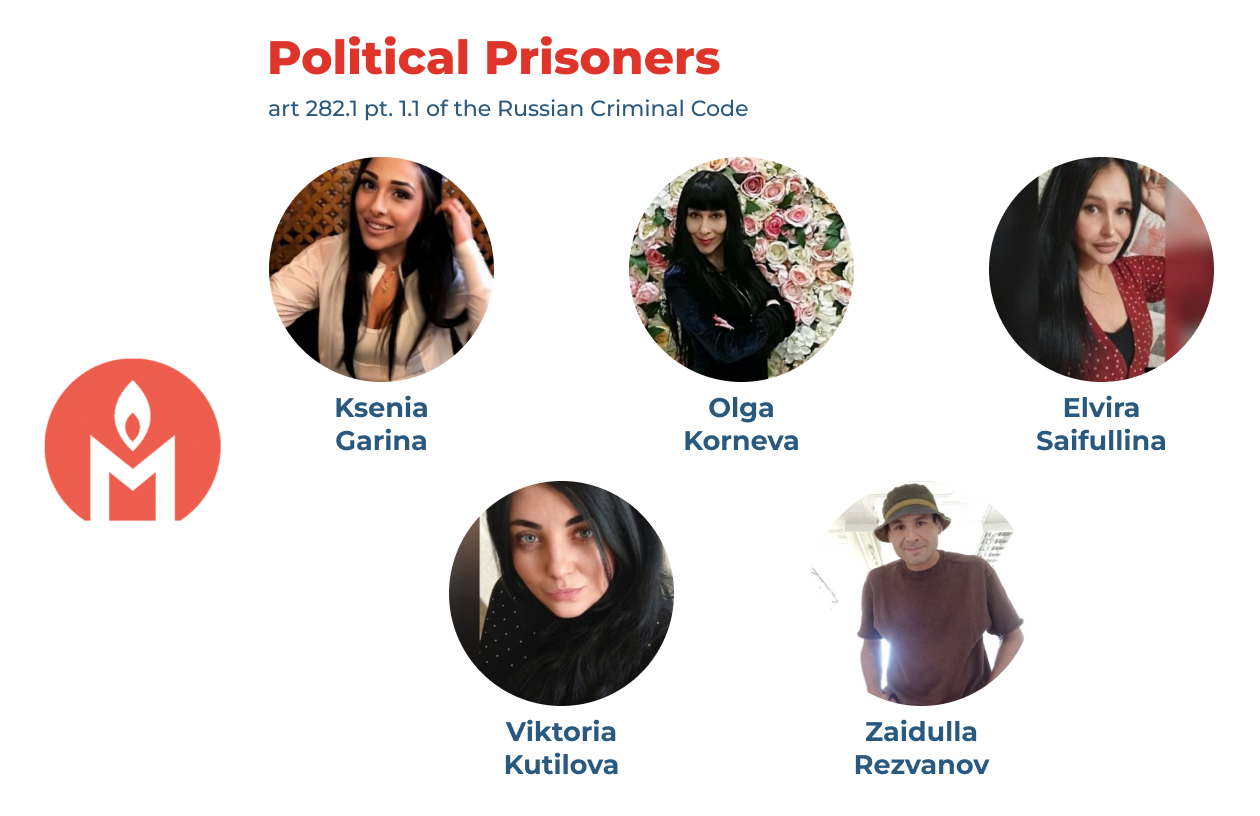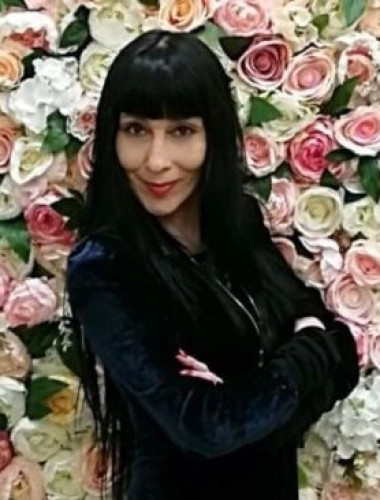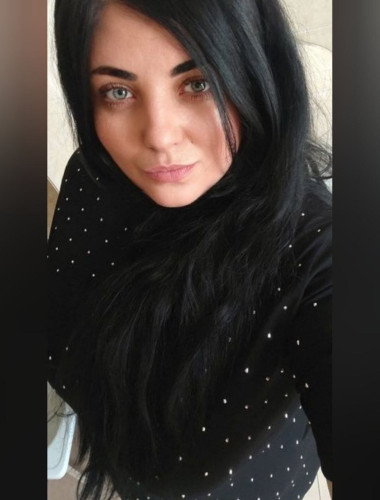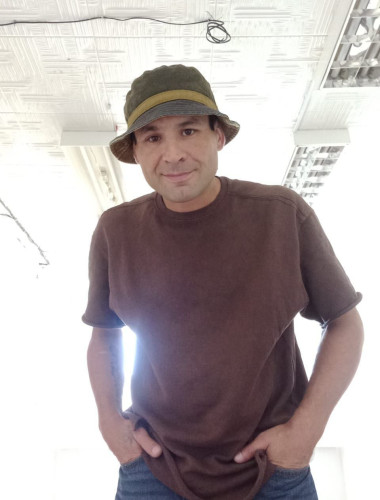Ksenia Garina, Olga Korneva, Elvira Saifullina, Viktoria Kutilova, and Zaidulla Rezvanov are political prisoners
The five individuals are being prosecuted on charges of ‘involvement in an extremist group’ and alleged participation in the ANTI PYTKI project
The ‘Political Prisoners. Memorial’ human rights project, in accordance with international standards, considers Ksenia Garina, Olga Korneva, Elvira Saifullina, Viktoria Kutilova, and Zaidulla Rezvanov political prisoners. The five individuals are being prosecuted on charges of involvement in an extremist group for alleged participation in the ANTI PYTKI project. Their criminal prosecution violates their rights to freedom of association, freedom of expression and fair trial. We demand their immediate release and that all criminal charges against them be dropped.

What are the charges against Ksenia Garina, Olga Korneva, Elvira Saifullina, Viktoria Kutilova, and Zaidulla Rezvanov?
Since 2021, the ANTI PYTKI [‘Anti Torture’] project has published information on Telegram about torture in penal colonies and cell-type prisons. The project gathers testimonies from victims, as well as information about prisoners allegedly involved in torture and officers of the penitentiary service believed to be responsible for organising systematic torture.
On 30 October 2024, searches were conducted across various regions of Russia. Those detained were charged with involvement in an extremist group (Article 282.1, Part 1.1, of the Russian Criminal Code). Garina, Korneva, Kutilova, and Rezvanov were remanded in custody; Saifullina was placed under house arrest.
The investigative authorities claim that ANTI PYTKI was created to ‘carry out extremist crimes’ and that its members distributed materials that allegedly encouraged violence among inmates.
Project founder Roman Rugevich, also a defendant in the case, is being prosecuted as the creator of an extremist group (Article 282.1, Part 1). He is currently outside Russia.
The charges rely on the testimony of Nikita Yevshin, given after he was taken into custody on charges of attempted murder. Yevshin claimed he had moderated the online ANTI PYTKI community and identified Garina, Korneva, Kutilova, Rezvanov, and Saifullina as his colleagues.
Why do we consider the defendants in the ANTI PYTKI case political prisoners?
The defendants are not accused of specific acts of violence but of involvement in an ‘extremist group,’ a term the investigative authorities consider applies to the ANTI PYTKI project.
The project engaged in collecting and publishing information about torture and human rights violations in detention facilities. We believe the real reason behind the prosecution is that the project hinders the entrenched practice of using prisoners in ‘investigative work’ involving violence and so-called ‘press huts,’ special places of detention used to put pressure on prisoners.
The investigative authorities presented no evidence that the ANTI PYTKI project recruited or incited anyone to commit crimes. The criminal cases cited in the charges, related to the use of violence by some prisoners against others, have nothing to do with the defendants in the case and do not prove the group was extremist in nature.
There is not even any reliable evidence that Garina, Korneva, Kutilova, Rezvanov or Saifullina were involved in any significant way in the ANTI PYTKI project. The testimony of Nikita Yevshin, himself a defendant in the case, is questionable: this ‘witness’ had previously been charged with violent crimes on several occasions and suffers from a mental disorder.
According to project head Rugevich, none of the detained individuals were involved in creating ANTI PYTKI content or moderating its online groups. Garina and Korneva volunteered by correcting spelling and grammar in written complaints about torture that prisoners sent to human rights organisations. Saifullina, Kutilova, and Rezvanov were simply subscribers to the Telegram channel. Rugevich claims Yevshin only once submitted material to the group’s channel and was never a moderator or project staff member.
Reports of torture and violence in places of detention are of public interest and should be freely disseminated and openly discussed. Allegations of such crimes should prompt investigation, not the prosecution of those who report them.
A detailed description of the case of Ksenia Garina, Olga Korneva, Elvira Saifullina, Viktoria Kutilova, and Zaidulla Rezvanov and of our position is available on our website.
Recognition of an individual as a political prisoner does not imply the ‘Political Prisoners. Memorial’ human rights project agrees with, or approves, their views, statements, or actions.
How can you help?
You can write to Ksenia Garina, Olga Korneva and Viktoria Kutilova at the following address:
RU:
624140, Свердловская область, г. Кировград, ул. Дзержинского, 26. ФКУ СИЗО-6 УФСИН России по Свердловской области.
● Гариной Ксении Сергеевне, 1997 г. р.
● Корневой Ольге Альфредовне, 1971 г. р.
● Кутиловой Виктории Эдуардовне, 1992 г. р. (предположительно)
EN:
● Ksenia Sergeevna Garina (born 1997),
● Olga Alfredovna Korneva (born 1971),
● Viktoria Eduardovna Kutilova (born 1992, presumed),
Remand Prison No. 6, Federal Penitentiary Service of Russia for Sverdlovsk Oblast, 26 Dzerzhinskogo Street, Kirovgrad, Sverdlovsk Oblast, 624140, Russia.
You can also send an email using the F-Pismo and ZT services (for payment with Russian bank cards), PrisonMail (for payment with other bank cards), OVD-Info and Memorial-France (free of charge).
Please note that letters in languages other than Russian are highly unlikely to reach the intended recipient.
If you have information as to where Zaidulla Rezvanov is being held, please contact our Telegram bot or email us at [email protected]
You can donate to help all political prisoners in Russia.




